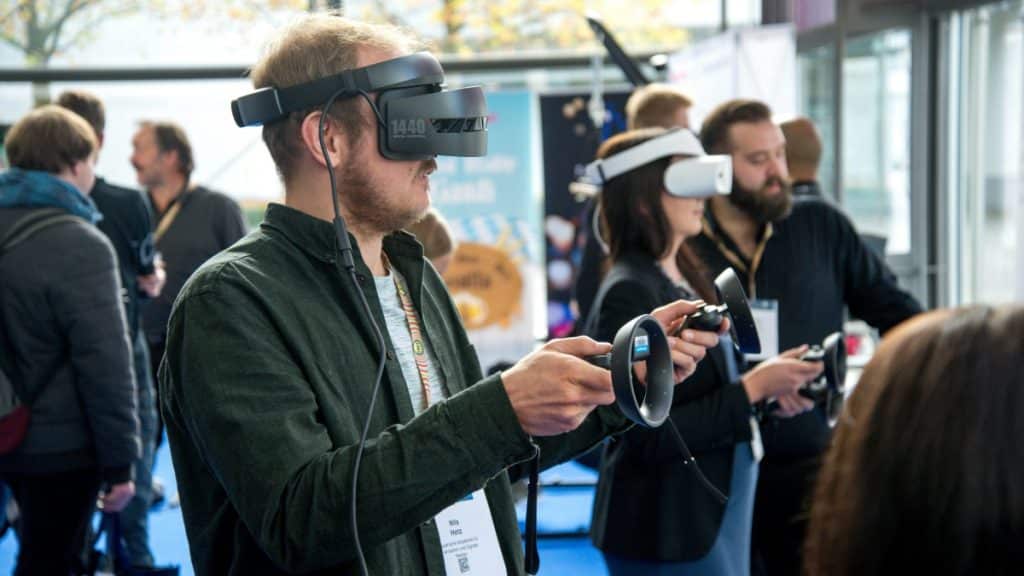Virtual reality (VR) has radically changed how we experience digital space. VR games offer us new and exciting lives in which further enhancement is possible. The next definite progress in Virtual Reality gaming is full immersion, the type of experience that aims to eliminate the wall between the player and the virtual world.
This new generation of VR gaming is a full package with high-resolution headsets, full-body tracking, haptic feedback, and surround sound to make the users feel like they are in the gameplay. Users will experience more than just seeing and hearing the virtual world. They will also feel, smell, and touch the environment with their hands.
In games where we are fully immersed, we can learn to fight like gladiators, build worlds, or race fantastic cars under a futuristic sky. Imagine going to a virtual museum and exploring the ruins of an ancient civilization or becoming a medieval warrior in a training environment. Games in which we interact in-depth can make our fun unique.
This evolution has already been seen in other areas of entertainment, such as casinos, which have long since evolved. Today, there are much more than just digital gaming areas. An example of this can be seen in much more specialized websites such as casinobonusca, where they work exhaustively to provide all the information about casinos’ bonuses. This does not mean that you cannot see the kind of games they have and their payment methods.
Total immersion will change the video game industry into something that will be more real, delightful, and thrilling than ever before. New types of games which could not be made with current technology can be created too.
However, full immersion technology is still under development. It will likely be available quickly, with companies like Oculus, Sony, and HTC already oriented about devices and software providing full-immersion experiences.
For this reason, the future of virtual reality gaming is optimistic with this new technology to make gaming experiences the likes of no other. Technological improvements are major factors in the perfect storm of full immersion in VR games.
Latter-type VR headsets move toward higher resolution and faster refresh rates, allowing for a more realistic sensory perception. Moreover, haptic controllers are being developed, allowing players to interact physically with a virtual world through tactile feedback. Different devices, for example, gloves and haptic suits, would provide users with a tactile sensation, which would also complement the visual and auditory experience, thus creating a more immersive virtual reality environment.
Moreover, total immersion is related to technology and game design innovation, which is exploding at the moment. Developers are always thinking up new narrative and level designs to create virtual worlds that can grip players completely. Ranging from realistic ones to surreal ones, full immersion should bring players to futuristic worlds with high quality and detail that have never been made before.
Besides that, the emphasis on the sound effect that draws players into the world of VR more is an important task for VR game developers, as is the interactivity with the virtual environment.
While this is an incredible opportunity full immersion offers, we should know the issues that come with it and take them into account. Issues such as motion sickness, which the simulation of realistic movements can cause, need to be considered and addressed to ensure the game is comfortable for everyone.
Moreover, making virtual reality experiences accessible and safe is critical for the technology to be broadly adopted and for players to use it safely and fairly. Companies like Google and Microsoft have developed VR accessibility solutions, which include voice commands and simplified navigation options to be used by people with different abilities and needs.
From now on, the mainstream of VR gaming will be fully immersed. Following the massive wave of technological advancement, with developers who constantly strive to create more realistic gaming experiences, we expect to see a great rise in the quality and innovation of virtual reality gaming.
The invention of full immersion sets the tone for what virtual reality can accomplish, and, in a sense, it opens a path to subjects previously deemed unreachable by VR and the real world. In light of the fast development of VR devices and software, as well as the deep thinking of developers, which breaks the limits of what has been possible so far, virtual reality games have unlimited prospects. Can you imagine a future where VR games go beyond the tangible realm of reality itself, creating encounters that not only have the ability to immerse the player but are distinguishable from the real world?

